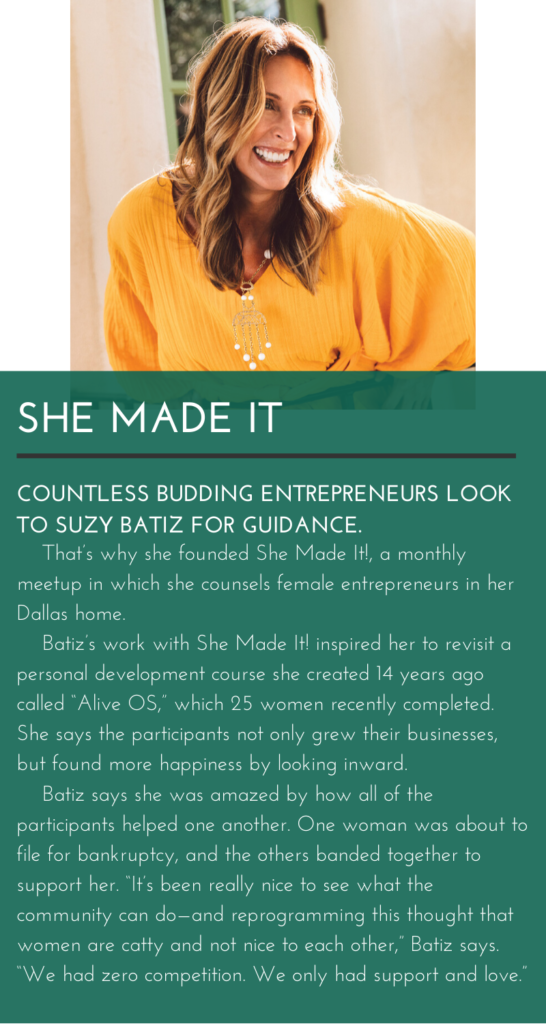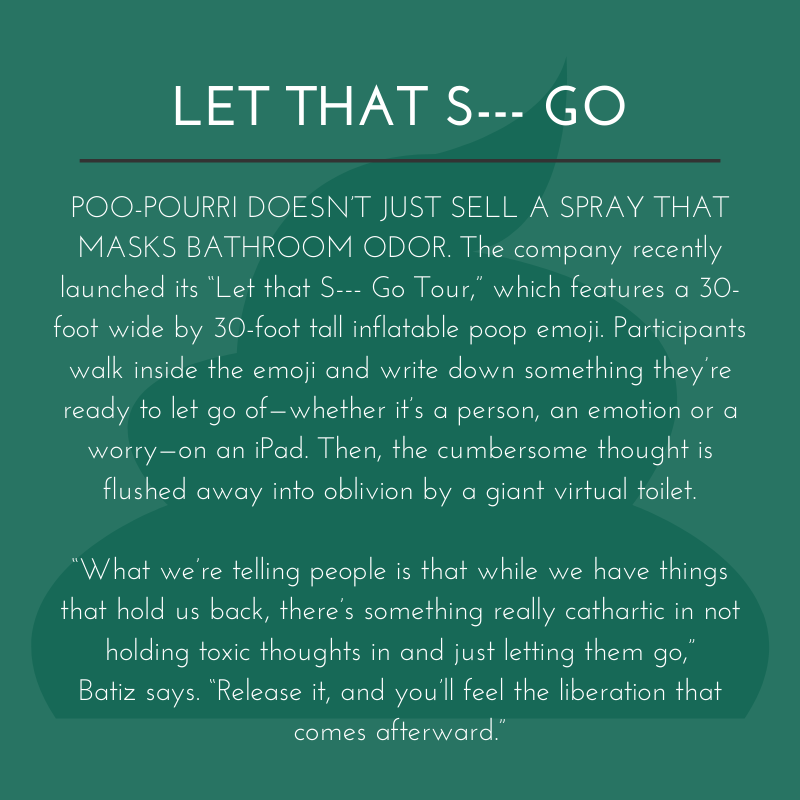Suzy Batiz is a hustler.
She’s helmed a tanning salon, bridal store, clothing shop and staffing startup. She’s bejeweled sweat suits and designed denim high heels. At one point, she even sold lingerie by having her boyfriend at the time take a catalogue into strip clubs.
“That was a really good business for a few months,” she says. “Until the bar owner, who had three fingers missing, called my boyfriend into his office and said, ‘Where’s my cut?’”
Batiz, 55, is no stranger to the struggle of entrepreneurship. Myriad business ideas of hers failed, not to mention she filed for bankruptcy twice. After some deep introspection, she realized what was holding her back: She was too focused on making money.
“I always thought money was going to get me out of all of the situations I was in,” she says. “I would be loved right and appreciated if I just had money.”
Fast-forward several years to 2005. Batiz had sworn off business and just spent four years on a spiritual sabbatical. She was at a dinner party when her brother-in-law asked, “Can bathroom odor be trapped?”
Batiz immediately perked up. She was familiar with essential oils and knew she could create a product that locked odor below the surface of toilet water. “I felt like a zing up my left arm and the front of my leg,” she says. “It was just like the lights came on brighter and I was like, I could do that.”
And so Poo-Pourri—yep, Poo-Pourri—was born.
What started as a simple idea at a dinner party has turned into a nationally recognized company valued at $400 million. The founder herself is worth an estimated $240 million, tied with Reese Witherspoon on Forbes’ 2019 list of the richest self-made women in the U.S. She lives in a 15,000-square-foot church-turned-home in Dallas that is the envy of interior designers across the globe.
Batiz, who has wavy blonde hair and a wide smile, says her success can all be attributed to a deep shift in priorities.
“Success is an inside job,” she says. “Nothing external is ever going to fulfill you. Success is not about money. It’s about feeling good about yourself and having a richness inside.”
THE LUXURY OF LOSING EVERYTHING
Batiz’s journey hasn’t been easy.
“I grew up in Arkansas with poor parents who did some good (stuff), some bad (stuff), some crazy (stuff) and some weird (stuff),” she says.
Saying Batiz grew up in a dysfunctional home would be an understatement. Her father was a bipolar alcoholic, while her mother was addicted to pain pills. Her parents eventually got divorced, and she was molested by her stepfather. She was married, bankrupt and divorced by 20. At 21, she tried to kill herself. At 23, she had a baby and entered an abusive marriage. She escaped that marriage and was homeless with two children before getting married a second time.
“The way I talk about it is I was skiing on a double black diamond and I lost a ski halfway down the mountain,” she says. “I was always just trying to hang on, trying to get myself out of some sort of hole that I always seemed to be in.”
She hustled for the next several years until she was 38, when she filed for bankruptcy for the second time and fell into a deep depression.
“If I didn’t have my children and my family, I’m sure I would’ve tried to kill myself again,” she says. “I was done—just emotionally and psychologically. I was done with business; I was done with life.”
Batiz is thankful for this time in her life because she had what she calls the luxury of losing everything. “Rarely do we have a time when we get pretty much a full stop,” she says. “It really gave me time to look inside and face myself and see what I’d been up to.”
I tell Batiz how, despite the challenges she’s faced over the years, she seems so confident and calm now.
“I’ve done a (sizeable) load of personal work over the past 15 years, girl,” she says, laughing.
EXPONENTIAL GROWTH
About that four-year spiritual sabbatical, which came after her lowest point: “I found happiness and success within my own being for the first time in my life,” she says. “And I had sworn off business.”
Cue the aforementioned dinner party. A self-proclaimed closet hippie, Batiz had been experimenting with essential oils for decades. “I went home and just started mixing and mixing and mixing,” she says. “It took me nine months. Not one person thought it was a good idea. Everyone thought I was completely insane. But I knew I could do it. I felt it.”

Poo-Pourri is a before-you-go toilet spray that works like this: You spray the product in the toilet bowl before using the bathroom. It creates a film on the surface of the water, which traps odor.
Batiz created version after version, constantly in pursuit of the perfect concoction. She had her husband (now ex) and friends test the product as much as possible.
“I’ll never forget the day my husband walked out of the bathroom and he was like, ‘Oh my god, we’re going to be millionaires. It works! Do you realize what you’ve done?,’ ” Batiz says. “It was just super exciting.”
Her ex-husband created a shoddy website, and Batiz began giving friends the product to try. Her first client was a friend of a friend who wanted to sell Poo-Pourri at his gift shop in Dallas. Shortly thereafter, another shop called, and another, and so on and so forth. Someone suggested Batiz take her product to market, so she did. “It literally grew word-of-mouth like that,” she says. “We did $1 million in the first year.”
Now 13 years later, Poo-Pourri is available both online and in countless brick-and-mortar shops like Bed, Bath & Beyond and Target. The company has sold over $300 million in product.
BREAKING DOWN BARRIERS
Most people are familiar with Poo-Pourri not necessarily because they’ve bought the product, but because they’ve seen one of the company’s viral videos, which have more than 350 million total views on YouTube.
In 2013, several companies were trying to copy Poo-Pourri, Batiz says. She knew she had to take her product to the next level. “I knew I had to look for some sort of alternative, rebellious marketing move—some guerilla-type marketing,” she says.
“Girls Don’t Poop,” the company’s first viral video, has a whopping 42 million views and counting on YouTube. The two-minute clip features a perfectly coiffed redhead clad in a turquoise fit-and-flare dress and pearl necklace. In a proper British accent, she describes a secretive, hmm… burial at sea. Within a few days of the video’s release, the company sold all of their inventory and was $4 million in backorder.
“Suzy doesn’t do things only with the goal of making money,” says Nicole Story Dent, senior vice president of creative for Poo-Pourri, who has worked closely with Batiz on the company’s viral videos. “She makes choices because they light her up and feel right in her gut. It may sound bizarre to people on the outside looking in, but it ends up making us money and building the brand even though it’s not our goal.”
What Batiz is most proud of when it comes to Poo-Pourri isn’t her wild financial success, she says, but rather the way her company has helped people talk about a taboo topic.
Several years ago, Batiz was seated next to a 65-year-old gaming attorney on a flight. She told him about her company.
“Oh my god, I got this at a friend’s house,” the man said before proceeding to tell her a very personal bathroom story.
“All of the sudden, he looks at me and he goes, ‘I cannot believe I’m a 65-year-old man sitting here telling you about my poop,’ ” Batiz says.
That’s when it clicked in her mind that Poo-Pourri was more than just a product. “Poop is everywhere,” she says. “There’s the poop emoji. And now, we talk about poop. I really attribute a lot of that to us. We made it OK because we used humor to help break that taboo topic.”
Gillian Ferrabee, founder and president of Kite Parade, has been friends with Batiz since the two connected professionally in 2013.
“Suzy understands how to approach taboo subjects so that people can get on board with minimum resistance,” Ferrabee says. “She never sits on her laurels. She keeps the momentum going at the speed of life.”
SEARCHING WITHIN
I ask Batiz whether self-care plays a big role in her life.
Let’s just say I’m not expecting her answer.
On a weekly basis, Batiz has a therapy session, meets with her spiritual coach and mentor, has a three-hour deep tissue massage and an hour-long IV drip. She exercises and meditates daily. She also has her own nutritionist and medical director, and occasionally practices reiki, a sort of Japanese touch therapy.
Matter-of-factly, she will tell you about other, hmm… natural remedies in which she partakes.
This emphasis on self-care—what Batiz simply calls “staying balanced”—is a necessary antidote to her fast-paced life. “I operate at such an energetic rate that a lot of the stuff I do is just good hygiene to make sure the fast life I’m living doesn’t build up and kill me,” she says.

Batiz found out she was on the 2019 Forbes list of the richest self-made women in America when her colleagues showed her a photo spread that featured her alongside hard hitters like Witherspoon, Rihanna and Kylie Jenner. She assumed her colleagues photoshopped her in.
“I was just like, ‘Holy (guacamole), I can’t believe this is happening,’ ” she says.
A few days later, Batiz’s friend sent her the country song “Girl Goin’ Nowhere” by Ashley McBryde. It tells the story of a young woman who achieves success despite the odds being stacked against her. One lyric reads: “And where they said I’d never be is exactly where I am.”
The gravity of everything Batiz had accomplished truly set in. “I laid on my kitchen floor for about four hours on a Sunday morning bawling—crying to the point where I just couldn’t get up,” she says.
Batiz says this outpouring of emotion wasn’t because of her external financial success, but rather because she realized she’d broken generational poverty in her family for decades to come.
“If I had one wish, it would be that people knew they could create any life they want—that anything really is possible,” she says. “While I’m excited about the success of Poo-Pourri and where we’re going, it’s more about me being an example of what’s possible.”
This article originally appeared in the July/August 2020 issue of SUCCESS magazine.
Photos courtesy of Suzy Batiz





